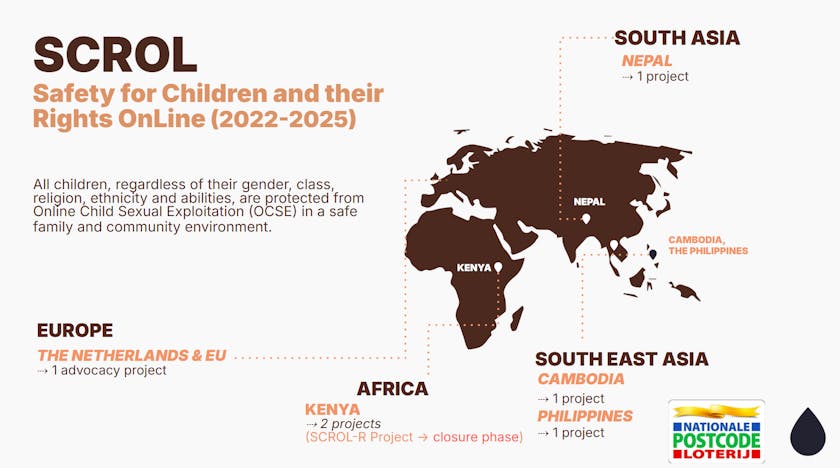New child safety online research presented

TdH NL SUFASEC and SCROL projects contributed research to the 2nd International Child Rights Conference
Two new Terre des Hommes Netherlands studies were shared for the first time at the 2nd International Conference of Children’s Rights: Artificial Intelligence, Online Safety and Children’s Rights in the Online Environment. The Conference was hosted in Stellenbosch, South Africa by the University of Stellenbosch Law Faculty and Nelson Mandela Children’s Fund, from 9 to 11 September 2025. Emerging themes from the VOICE-Identity Study and the SCROL Parent Study were presented.
Abstracts
Disability, ethnicity, gender and sexuality: Navigating Intersectionality in
Tech-Facilitated Sexual Exploitation of Children

Digital platforms offer opportunities for learning, connection and self-expression, yet also
expose children to exploitation, grooming and abuse. While much research addresses
general online risks, less is known about how these risks and opportunities are shaped by
children’s identities and lived experiences. The qualitative VOICE-Identity study examines how intersecting, marginalised identity factors shape children’s vulnerability to and protection from technology-facilitated sexual exploitation of children. The study developed three case studies based on focus groups and interviews with children with disabilities in Bangladesh, indigenous Aymara children in Bolivia, and children with diverse sexual orientations and gender identities (SOGIESC) in The Netherlands. The study explored how children navigate online spaces, perceive risks, and experience protective and harmful influences. The presentation focused on emerging themes spanning the three study populations.

This study was authored by Isabella Lanza Turner, Eva Notté, Md. Shah Moazzem Hossain, Md. Ahsan Habib, Mare Metz, Yulidsa Bedoya Zúñiga, Charlotte Tierolf, Fadime Özcan, Kimberley Anderson and Jean Elphick. The study was presented by Dr. Jean Elphick, Head of Research, Expertise and Influencing.
This study was supported by the Down to Zero Alliance as part of the SUFASEC Project, funded by The Dutch Ministry of Foreign Affairs, and the Inneke Feitz Stichting.
From Digital Divides to Digital Rights: Strengthening Families in Cambodia, Kenya,
Nepal, and The Philippines to Protect Children from Online and AI-Enabled Sexual
Exploitation

Terre des Hommes Netherlands, through its multi-country Safety for Children and
their Rights Online (SCROL) programme, addresses the urgent and evolving threat of Online
Child Sexual Exploitation (OCSE) in Cambodia, Kenya, Nepal, and The Philippines. Guided
by the UN Convention on the Rights of the Child (CRC) and General Comment No. 25 on
children’s rights in the digital environment, SCROL’s recent research with 449 children,
parents, caregivers, and community actors reveals stark intergenerational digital divides,
limited caregiver awareness of OCSE, stigma, and barriers to safe disclosure and response.
Many children navigate online risks without guidance, while caregivers—overwhelmed by
technological change—struggle to fulfil their duty to protect, underscoring States’ and
societies’ obligations to respect, protect, and fulfil children’s rights to protection, participation,
and access to information in digital spaces.
Building on this evidence, SCROL implements integrated prevention and response
strategies across family, community, institutional, policy, and digital spheres in order to
catalyse systemic change. These interventions are informed by a socio-ecological model
and are centred on gender-transformative and inclusive, participatory, and non-discriminatory approaches, reflecting CRC principles and aiming to empower children and strengthen caregivers’ knowledge, attitudes and behaviour in relation to online safety, while building protective community and institutional systems.

In light of the rise of AI-enabled abuse such as deepfakes and AI-generated child sexual abuse material, as well as the use of AI tools by offenders to scale grooming, sexual extortion, trafficking and exploitation of children, Terre des Hommes Netherlands calls for child-centred AI governance. This entails embedding safeguarding principles into AI design and regulation, strengthening AI literacy for children and caregivers, and holding technology actors accountable for upholding children’s rights to safety, dignity, and privacy. Terre des Hommes Netherlands calls for child-centred regulation and governance throughout the entire lifecycle of AI, including the design, development, deployment and maintenance of such technologies.
Terre des Hommes Netherlands advocates for a whole-of-society approach, demanding action and collaboration across key stakeholders, including academia, governments, AI/technology companies, children’s rights organisations, law enforcement, educators and parents/carers. This child-centred, rights-based, and evidence-informed approach offers concrete pathways for normative and policy development that ensure technologies of the future act as catalysts—not threats—to the full realisation of children’s rights worldwide.
Presented by Dr. Zosa Gruber, Head of the SEC Thematic Programme.
This project and study were supported by the Nationale Postcode Loterij.



